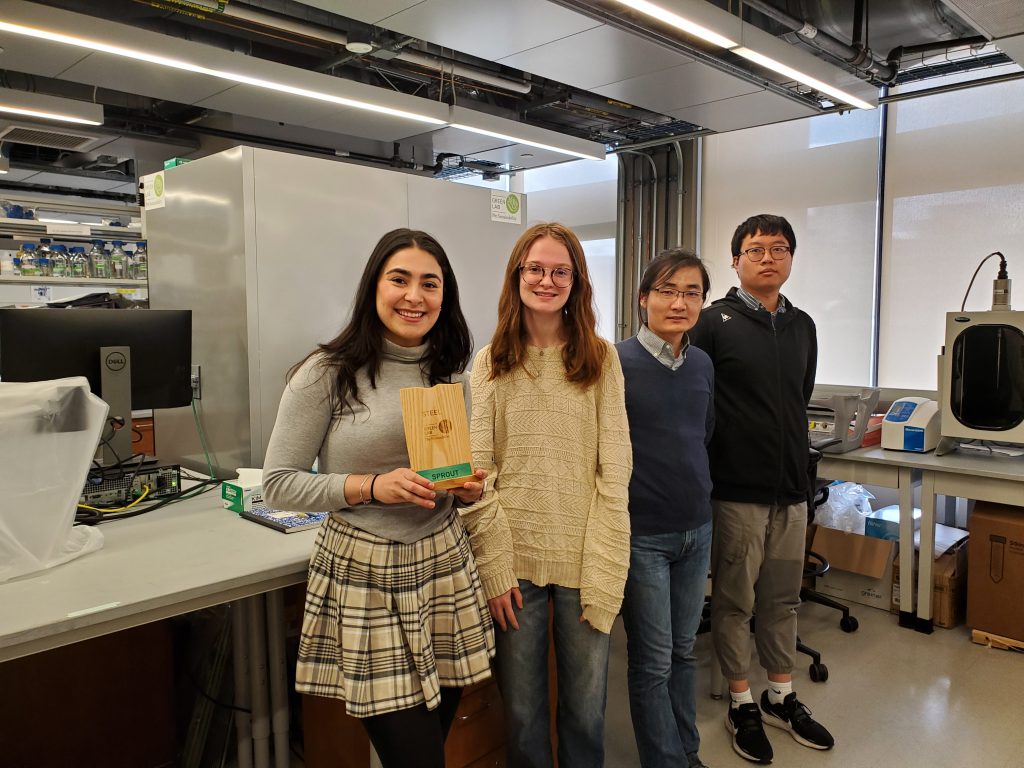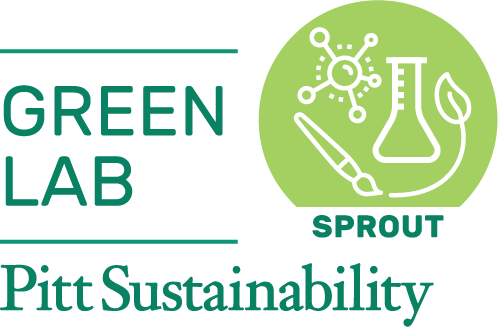October 2023 Pitt Green Spotlight: STEEL Lab
The Pitt Green Spotlight is a monthly series highlighting Pitt’s Green Offices & Labs! Each post highlights Pitt Green Offices and/or Labs, sharing their experiences implementing sustainable practices, tips and tricks, lessons learned, and opportunities for more sustainable work at Pitt.
We hope these Green Offices & Labs will inspire you to try out new sustainable practices in your own workspace! Want to be included in our next highlight? Contact us.
Pitt Green Lab Spotlight:
Sustainable Technologies for Environmental Engineering Lab (STEEL), Swanson School of Engineering, Benedum Hall


Pitt Green Lab Team (left to right): Maria Jimenez, Sophie Bazydola, Dr. Meng Wang (PI), Zhiquian Han
Green Lab since October 2022
Sophie Bazydola (undergrad researcher)
What practice would you recommend other labs try out, especially those who are just beginning?
Use glass bottles, beakers, flasks, etc. when possible. If they break or need to be discarded, glass can be more easily recycled than plastic.
There are many recycling programs out there for many plastic items in labs. You will usually have to pay to have these items recycled, but if you can afford it it’s a good practice to have.
Find ways to repurpose waste that’s generated around the lab. ex. use empty micropipette boxes as storage or buy pipette tip refills to refill the boxes with.
What opportunities or challenges would you like to see addressed for a more sustainable lab?
Our lab produces a lot of plastic waste. Most of it is hard to avoid due to our work involving microbiology and molecular biology techniques, which generates a lot of plastic that can’t be reused. I think we should try to recycle more of the plastic that we generate if possible. We could find ways to recycle pipette tips and boxes, petri dishes, well plates, etc. to hopefully further the lifespan of the plastic used to make these materials.
Dr. Meng Wang (Assistant professor)
What sparked you to start looking for ways to make your lab operate more sustainably?
When I was a graduate student, a senior colleague once said that the lab (a lab in environmental engineering) was dedicated to developing solutions for reducing waste in the environment, yet we produced a significant amount. Her observation resonated with me, and it prompted me to look for ways to make the lab operate more sustainably.
What sustainable practices have made the most noticeable difference in your lab?
Joining the Pitt Green Lab program. It has heightened our group’s awareness of our lab’s sustainability footprint, enabling us to identify and adopt more eco-friendly practices.
What practice would you recommend other labs try out, especially those who are just beginning?
I’d suggest starting with the Pitt Green Labs self-assessment. It offers valuable insights into potential areas for improvement. Also, consider simple measures like recycling and reusing pipette tip boxes as storage for microcentrifuge tubes, filters, or other small lab items.
What opportunities or challenges would you like to see addressed for a more sustainable lab?
There’s been a noticeable shift from glassware to disposable plastic items in labs due to safety or other concerns. We find a large portion of our lab waste to be plastic. Establishing recycling programs specifically for lab plastics could be a significant step toward improving lab sustainability.
Maria Jimenez (PhD student)
What sparked you to start looking for ways to make your lab operate more sustainably?
The initial catalyst for this journey was my participation in a circular economy class. As part of the coursework, I gained a deeper understanding of the importance of sustainability in achieving circularity, a topic that I’m personally very attracted to. The second significant reason behind our commitment to sustainability is the nature of our research group’s focus. We specialize in environmental bioremediation, water treatment, and green synthesis. For us, it makes a lot of sense to align our laboratory operations with the principles and goals we aim to achieve in our research. By adopting sustainable practices in our lab, we not only reduce our environmental footprint but also ensure that our actions are consistent with the principles we advocate in our scientific work.
What sustainable practices have made the most noticeable difference in your lab?
Our lab has adopted several impactful sustainable practices, including responsible vendor selection, careful inventory management to minimize waste, reducing order frequency to lower shipping emissions, recycling packaging materials, and efficient experimental planning. We also placed signs promoting sustainable practices, such as “Shut the sash, save energy,” or reminders to unplug equipment that is not in constant use.
These practices have significantly reduced costs, minimized waste, and aligned our operations with our commitment to sustainability.
What practice would you recommend other labs try out, especially those who are just beginning?
I would recommend that other labs, especially those who are just beginning their journey towards sustainability, consider implementing effective inventory management practices. In our experience, this has proven to be both accessible and highly impactful. By keeping a close eye on inventory levels, labs can significantly reduce unnecessary purchases, minimize waste, and optimize resource usage. This practice not only contributes to cost savings but also aligns with the broader goal of sustainability. It’s a relatively simple step that can make a substantial difference in reducing environmental impact and improving resource efficiency.
What opportunities or challenges would you like to see addressed for a more sustainable lab?
We face numerous challenges, particularly since our lab specializes in microbiology and biotechnology research. This specialization makes our lab energy-intensive, and a significant portion of our waste is challenging to recycle or cannot be recycled.
As we are just beginning our journey, I believe the opportunities are vast. We can explore energy-efficient solutions and enhance waste management and reduction strategies.